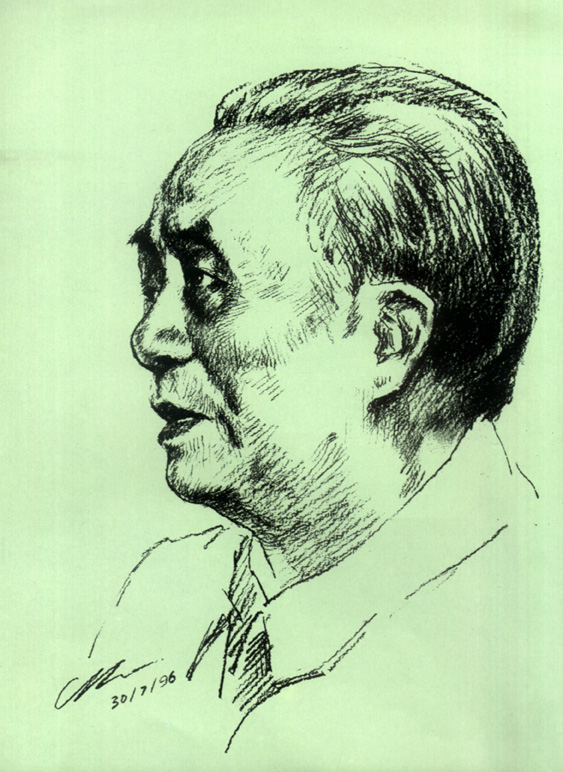 AI QING 艾青 LEI CHI NGOK 李志 LI ZHIYUE 1996. Pencil on paper. 21.0cm × 30.0cm.
AI QING 艾青 LEI CHI NGOK 李志 LI ZHIYUE 1996. Pencil on paper. 21.0cm × 30.0cm.
I kept meaning to visit Ai Qing one more time, but never seemed to be able to find the time to do so. One of the ills of our modern urban existence is that we can 'never find time'. It is a form of inertia which persists between people. Before I moved house three or four years ago, I lived not far from Ai Qing, about a twenty minute cycle ride away, so I often 'found time' to call on him. I was even nearer to Di Fan's• house, so near in fact that we used to get together often to watch football on the television. After I moved, I was much further away and we did not have our own car. We often relied on using the phone to convey New Year's greetings even to relatives.
Eventually, one day, most likely a Sunday afternoon in February, I made a firm decision to make the effort. So I rang Gao Ying• and told her that it was almost a year since I had seen Old Ai, that I was really missing him and that I was going to visit that very day! But Gao Ying expressed reservations on the phone:
- "It is so windy today, can we make it another time? And another thing - I have got to go to pick some people up from the airport later on. You would be very welcome another time."
I hesitated. I knew how warmhearted Gao Ying was: if I were to go after all, she would be sure to be there when I talked to Ai Qing and eat dinner with me. Gao Ying was always bluntly familiar with her friends. Whenever I was due to go abroad, she would ask:
- "Have you got enough money? Let me help you out a bit."
Gao Ying's enthusiasm was a projection of Ai Qing's own character.
Who could have known that one moment of hesitation would deprive me of a last opportunity to meet Ai Qing, still alive, as the poet I had respected all my life, my mentor and friend? The next time I saw him, he was Ai Qing lying dead, enwreathed by funereal flowers.
Ai Qing, come back from that distant place, come back from that faraway time, before you outlived your three score years and ten. Ai Qing worked his wise brain tirelessly for many years, and brought about a second glorious peak in his literary career, which is a miraculous achievement in itself. He was active for such a very long time that what gushed forth as the product of such seasoned thinking was more magnificent than a volcano. For years he would rise with the dawn, dress hastily and set to work writing to make up for lost time. However, his long-suffering heart gave out in the end.
It was one day in June 1986. A poetry discussion meeting was being held in the Yuanwanglou lou bingguan• (Yuanwanglou Hotel) in Beijing·. Still seated, Ai Qing suddenly clapped his hand over his mouth and shouted out, interrupting the meeting. Ai Qing's words were:
-"It is time!"
The sound he made was clear and penetrating. Myself and a few other young writers stepped forward in concern and helped him down onto a sofa. We did our best to distract him while we waited for a doctor to come from the hospital. Ai Qing seemed to be overtired and soon fell asleep. At the time I had a premonition: his shouting had been so forceful. He was able to make it through the episode only because Chinese poetry was fortifying him, Chinese poetry needed him. He woke up soon enough and softly called out my name. I knew there was nothing I could do but stay by his side and do all I could to care for him in his hour of need. Other people I remember being there were Kuang Han, • Lei Shuyan• and Yang Mu. ·I went up close to him, he looked at me, wheezed a sigh and said:
-"The storm has passed!"
A doctor and an ambulance from Xiehe yiyuan• (Xiehe Hospital) soon arrived. Gao Ying had rushed to be there too. Ai Qing was saved! In retrospect, it felt as if my emotions had weathered a storm. So I wrote a poem: Fengbao guoqu le• (The Storm has Passed - for Ai Qing).
“一個老水手
突然間跌倒
很老的水手
曾經預言過建造遠望號的水手
曾經被囚禁在沙漠裏的水手
曾經被人尊敬如同船長的水手
突然間跌倒…
老水手躺在
一群年輕人雄健的臂彎
從他隧道一様瞳仁
流出一道幻覚
他看见陸地迅速向他逼近
白色的岸在向他誘惑”
“還有爲他開放的花叢與青草。”
("An old sailor
Topples over in a moment
A very old sailor
A sailor who foretold the building of the ship
Distant Hope
A sailor who has been incarcerated in the
prison of the desert
A sailor who has been respected like a
captain
Suddenly topples over...
The old sailor lies
Cradled in the strong arms of young people
From his pupils like tunnels
Flow a succession of hallucinations
He sees the ground rushing towards him
The white coast beckoning him
And the flowers and green grasses blooming for him")
Just one spell of dizziness, one stumbling fall, one daydream. This was what I was describing. Because the poetry steamship cannot leave the old sailor, the captain.
“強烈的睴眩過去了
風暴過去了…
教堂的鐘聲從来不屬於海
不屬於哪怕外星人中的水手
更不屬於遠望號…
遠望號在歡呼聲中
將赤道風重新鼓滿風帆
駛向無边無沿的大洋…”
("The blinding dizziness has abated
The storm has passed...
The chime of the church bells never belonged to the sea
It was never for the sailor among strangers
Much less for the ship Distant Hope...
While the Distant Hope's cheering call sounds
Once more filling her sails with the tropical wind
Driving towards the boundless wide ocean...")
When Ai Qing was saved, people in Chinese poetry circles breathed a sigh of relief. It had to be admitted, however, that the rules of the game could not be changed, the clock could not be turned back. Even though that great brain of Ai Qing's was still functioning, and Ai Qing retained a cheerful, philosophical and good-humoured outlook, he had nonetheless entered the final phase of his life. He was obliged to cancel all his outside engagements and most of his other appointments, and to devote more of his time to 'looking after himself'. Fortunately, Gao Ying was still young and able to help him in various ways, including coordinating his social life. She also helped him to manage the many other trivial but necessary minutiae of his life. It must be said that Ai Qing's last years were stable and happy. His dignity was preserved, and this is testament to the goodness and integrity of the rest of his life.
Over the next few years, changes in my work and a degree of turbulence in my own life meant that I was able to visit Ai Qing only seldom, but I still managed to make the effort once or twice a year. I was not usually alone; I was either in the company of people who respected and admired him and wanted to meet him, or I would attend one of the small gatherings of poets that Gao Ying organised from time to time. Ai Qing and Gao Ying almost never refused the bold requests for audiences and interviews they frequently received, regardless of the seniority of the applicant, or whether they were favourably or negatively disposed towards Ai Qing. They always treated visitors like old friends, which banished any awkwardness or formality. Ai Qing always used the thickest, plainest, down to earth language, and could produce a constant stream of humorous anecdotes. When I went to his house I never had any particular business or specific topic on my mind; other than just to spend a few more minutes in his company and listen to him talk: these were happy, casual occasions - and deeply fulfilling.
One evening around the middle of March 1992 is particularly memorable. My wife and I took a student called Xiao Mao, · who had returned from a period of study in Germany, and his charming young girlfriend Xiao Jing,• to meet Ai Qing. Oddly, we were the only visitors that evening. We had decided to stay about half an hour, not wanting to keep Ai Qing from going to bed early. But Ai Qing was very pleased to see us and we stayed for another halfhour.
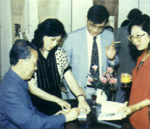 Ai Qing (left) autographing one of his books during the launching of his Ai Qing shixuan《艾青詩選》(Selected Poems by Ai Qing) Photograph taken in Macao, in 1987.
Ai Qing (left) autographing one of his books during the launching of his Ai Qing shixuan《艾青詩選》(Selected Poems by Ai Qing) Photograph taken in Macao, in 1987.
As soon as he saw me, Ai Qing used to love to tease me. He said:
- "How many years into your twenties are you?"
He said this with the charming feigned naivety of a wise man who appears slow-witted. We both roared with laughter, since we had already known each other for more than ten years and had spoken many, many times during the compilation of Ai Qing zhuanlun•(A Biography of Ai Qing). I reminded him that I was nearly fifty.
Ai Qing went on to ask how old my daughter was, and whether I was living in the Zuojia Xiehui• (Writers' Association) house. He knew that a few years earlier my plans were undecided, it seemed he had predicted that I wanted to go back to the Writers' Association.
I introduced him to the two new guests. He asked with concern:
-"So whereabouts in Beijing do you live?"
On hearing that they were staying with me, Ai Qing said quickly:
-"There are plenty of rooms in my house, and Gao Ying is a good hostess, so why don't you come and live here?"
To be thus invited on first acquaintance was quite moving for the young couple.
Xiao Mao said:
- "Ai Qing, you should rest more."
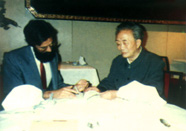 Dr. Jorge Cavaleiro (left) and Ai Qing (right) autographing one of his books during the launching of his Ai Qing shixuan 《艾青詩選》(Selected Poems by Ai Qing), a bilingual Chinese-Portuguese edition published by the Cultural Institute of Macao.
Photograph taken in Macao, in 1987.
Dr. Jorge Cavaleiro (left) and Ai Qing (right) autographing one of his books during the launching of his Ai Qing shixuan 《艾青詩選》(Selected Poems by Ai Qing), a bilingual Chinese-Portuguese edition published by the Cultural Institute of Macao.
Photograph taken in Macao, in 1987.
To which Ai Qing replied:
- "I should go out and see my friends more, you mean!"
Gao Ying was telling Xiao Jing how beautiful she thought she was, and Ai Qing asked her where she was from. She said Xi'an,• to which Ai Qing hastily commented:
- "I would have said you were Parisienne!" [Chinese pun on Xi'an]
This shows the unusually sharp talent way Ai Qing had for giving compliments, and it was the first time I heard him say anything in French. He went on to tell Xiao Jing:
- "You should be a supportive wife and a good mother. If he ever bullies you, you must come right over and tell me straight away."
Ai Qing treated them with the same affection and sternness he would have shown children of his own, and this warmed their hearts.
I had brought along with me a copy of my newly-published novel Xiangfeng zai Budapeisi• (Chance Meeting in Budapest) to give to Ai Qing. He leafed through it, said admiringly that the cover was very attractive, and asked if it had been printed in Hong Kong? How much did a copy cost? I said it was published by Huafa, • at which Ai Qing seemed surprised. He said:
- "You should have it produced in two separate halves, one about Buda, the other about Pest."
I knew that Ai Qing was quite knowledgeable about Europe, and that the by two halves about Buda and Pest he meant the two cities which are separated by the Danube and merged about a hundred years ago. Ai Qing also asked me:
- "Which half do you prefer?" This question stumped me.
The conversation somehow worked its way around to age. Ai Qing said:
- "I thought I was eighty-eight, but it turns out I am only eighty-three. Lu Xun• died when he was fifty-three, so I have lived thirty years longer than him. Lu Xun is being attacked in the press by many people, but he lived a dynamic life. Compared to Lu Xun, you could say that I have lived too long. Gao Ying is twenty-three years younger than I am, so it will take her twenty-three years to catch up. Yama• the King of Hell keeps a notebook, and people's lives are in his hands. If he forgets someone, then that person will live a long life."
We sat in silence and listened to Ai Qing's thoughts on life and death, all of us privately wishing that Yama would continue to keep him healthy and spare him from suffering illness.
Xiao Mao asked Ai Qing if he had been writing recently, which made Ai Qing laugh:
- "I shut my electricity off a while ago!"
Xiao Mao also asked him if he knew the scholar who was doing research into Ai Qing's work at Humboldt University in Berlin, but Ai Qing could only recall his Soviet friends Bidlov and Vedelin.
Our conversation rambled on, as we greedily drank from the fount of Ai Qing's wisdom. The large-screen television was turned on the whole time with the sound turned down low, as a diversion to give Ai Qing a chance to take rests. Gao Ying said:
-"Ai Qing loves to watch the television dramas. He has seen lots of the ones from Taiwan and Hong Kong. But he likes the wildlife programmes best, with all those scurrying little creatures and the elephants that pick things up with their trunks: they really fascinate him."
My wife Bo Dan• said aside:
-"It is a credit to Gao Ying that he is still with us today."
To which Gao Ying responded:
- "I am just a normal wife who had done what her husband required. People have been telling me for years that I neglect my duties, but my conscience is quite clear."
In fact, it was obvious to us all that Gao Ying cared for Ai Qing very thoughtfully. A simple example illustrates this: before they moved into their courtyard house, Gao Ying had planned in great detail the routes Ai Qing could take to the living room, study, bathroom and dining room, and even to places outside their home, so he would not have to negociate steps or steep inclines. She thought constantly of ways to make life easier for Ai Qing in his old age.
Bo Dan suddenly made a strange request: she asked if there was anything Ai Qing wanted to say to our daughter, who was not yet two. Ai Qing asked for a pen and paper, and wrote: "Chongchong tongzhi jinian"• ("A souvenir for Comrade Chongchong"). This form of address made us all laugh. Gao Ying took the piece of paper from him and said:
-"Do not make such a fool of yourself! Do it another day, in the morning when you have more energy."
The sad thing was that another opportunity never arose. We would have to wait until our daughter had grown up to be able to understand quite how regretful this was.
The sunlight was resisting the onslaught of dusk, as if to save Ai Qing's eyesight. The young couple said they felt the evening was unusually light. It was surely because we were all gathered round Ai Qing. Later that evening, the two young people were so inspired and stimulated that they went out and strolled through the streets near my house for half the night.
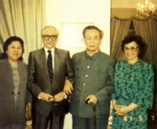
Left to right: Ai Qing's wife, Dr. Pinto Machado - former governor of Macao - Ai Qing, and Dr. Pinto Machado's wife.
Photograph taken in Macao, in 1987.
In the spring of 1994, I heard that Ai Qing was again gravely ill and that he had been admitted to one of the special rooms for foreigners at Xiehe Hospital, so it was definitely something serious. A friend of mine Zhang Manxin,• who was president of the Xiongyali Huaren lianhehui• (Hungarian Chinese Federation), happened to be in Beijing. He was also a lover of literature and an admirer of Ai Qing. When he heard that I was going to the hospital, he decided that he wanted to go with me to meet Ai Qing. So we bought a bouquet of flowers and a card and went to Xiehe.
Ai Qing's room was not large, and thankfully it was in reasonably quiet surroundings. Besides the drip stand and a narrow bed where the duty nurse slept, the room was full of fresh flowers. Ai Qing lay on a bed which could be raised and lowered. His face was rather glum, and he seemed to have aged a great deal over the previous two years.
What grieved me even more was that a purple coloured lotion had been smeared on his face and hands, apparently because of some internal secretion which had caused all sorts of other problems.
I could not bear to see Ai Qing suffering like this with the anguish of illness. Zhang Manxin whispered to me:
- "I cannot believe it."
Originally Zhang had wanted to ask Ai Qing if he had any message or letter for him to pass on to the President of Hungary. Zhang told me that Ai Qing and the Hungarian President had been classmates when they were both foreign students in France.
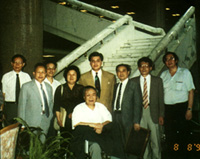
Ai Qing (bottom row center) with a group of scholars, writers and poets.
Photograph taken in Beijing, in 1990.
Ai Qing took my hand, not wanting to let go, and said my name. His hand was warm but weak and soft as cotton, covered all over with the purple blotches of lotion. My heart was once again filled with grief. Ai Qing still clasped my hand in silence; he was unable now to open his mouth to dispense his unusual, individual brand of humour as he had been able to two years before.
I knew from this silence that Ai Qing was very tired. He would close his eyes from time to time, and his breathing seemed heavy.
I hurriedly took a few photographs, mainly so that Zhang Manxin would have some thing to remember this moment by.
It was clear that we should not stay for too long. When I held out my hand to Ai Qing for a farewell handshake, I saw tears welling up in his eyes. We had been friends for sixteen years, and this was the first time I had ever seem him cry.
As we were walking out of the Xiehe Hospital, Zhang Manxin said:
- "It seems that you and Ai Qing were very close."
I did not say anything; my mind was on other things: was this really the last time I would ever see Ai Qing?
It turned out indeed to be so. Ai Qing was in Xiehe Hospital for several months, after which he left and returned home, to everyone's great surprise. I had never expected him to recover. I asked Gao Ying and Ai Dan regularly for updates on the situation, and had even prepared myself for my own final grief and regret. I should have done as I did in 1986, and once more rushed to be at my captain's side as the storm raged about him.
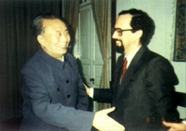
Ai Qing (left) and Dr. Mário Cordeiro (right) - former assistant secretary for Education and Culture.
Photograph taken in Macao, in 1987.
In Fengbao guoqu le•(The Storm has Passed), the poem I had written ten years earlier, I likened the sea and stormy weather to goodspirited children:
“可孩子們總是要来的,
孩子們總還是好動的。
老水手微笑著眺望:
孩子們願意來就來吧
就讓我回到孩子們的懐抱。”
("But there are always children yet to come,
The children with lively spirits.
The old sailor looks out with a smile:
If the children want to come then let them
Then I can return to the their embrace.")
I feel that at the end, Ai Qing returned to the sea; he fell back into the embrace of children.
Translated from the Chinese by: Justin Watkins
* Editor-in-Chief of the magazine "Chinese Writer."
start p. 147
end p.